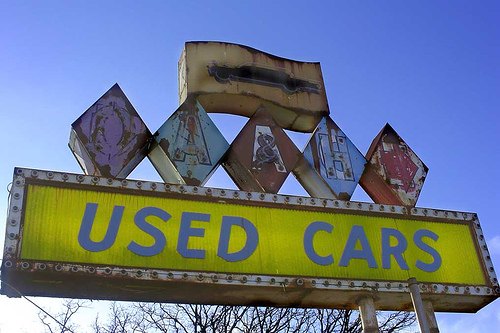Piston Slap: The Poverty Penalty

Louis writes:
Sajeev,
I recently got involved with helping a female friend who is going through a divorce get a car (in Phoenix, AZ), and it seemed to me that the basic economics of used cars have shifted (“Cash for Clunkers”?) Old used cars with high miles and no warranties appeared to be so expensive that a new car would yield a lower cost per mile driven (as well as a much lower level of risk for a single woman with no mechanical skills). I ended up lending her the money to buy a new 2010 Hyundai Elantra SE.
Still, I’m wondering if it is still possible to achieve a significantly lower cost per mile with a used car than you can get by buying a new one and driving it into the ground. Or, is there now a “poverty penalty”, where people without the cash or credit to buy a new car end up paying more per mile driven?
Sajeev answers:
Just this week I found the “Toronado of my generation”, an original Oldsmobile Aurora in stunning condition at a local dealership. It sold in less than a day for the asking price of $4995. At the height of GMAC’s profitability, a ride this old would be lucky to avoid the “Buy Here, Pay Here” lots. Anyway, your query implies there’s a cut and dry answer for all automotive purchases. Incorrect. The devil is in the details. But buying a 1-year-old Civic or Corolla with poor credit and no outside (i.e. bank, credit union, etc) source of financing available is probably not a bright idea in today’s economy.
Let’s say you want a 3-4 year old Focus, Versa, or any other perfectly acceptable form of motoring from a private seller. You then negotiate a price that’s far better than any dealership, reconditioning in mind. With a check from a local credit union in hand, odds are you’ll do far better than buying a new car. But that takes a lot of work, too much for most. So forget it.
I ran the numbers in a more believable scenario: 2.99% APR for 60 months from a local credit union to buy a 2008 Ford Focus SE with SYNC and a CPO warranty. The asking price is a bit high, I’d make it the “drive out” price instead. This also assumes the tires and brakes are new, because some dealers do just that as part of the CPO process. The payment on said Ford comes to $224 a month for the next 60 months.
Car number two was supposed to be a new 2011 Corolla LE, but there are still 2010s around: with 0% for 60 months and $500 cash back! Buying one with similar trimmings as the SYNC-fettled Focus, our friends at Edmunds believe it will sell for $16,300. The monthly payment: $272 for 60 months.
So is it worth buying a new car for an extra $48 a month? In this case, maybe. CPO cars can be just as good as a new one, far outlasting their owner’s desire for one vehicle. And while it took me about 30 minutes to come up with the scenario presented here, do most people do this level of due diligence when they need to buy a car?
Send your queries to mehta@ttac.com. Spare no details and ask for a speedy resolution if you’re in a hurry.

More by Sajeev Mehta
Latest Car Reviews
Read moreLatest Product Reviews
Read moreRecent Comments
- Rochester I recently test drove the Maverick and can confirm your pros & cons list. Spot on.
- ToolGuy TG likes price reductions.
- ToolGuy I could go for a Mustang with a Subaru powertrain. (Maybe some additional ground clearance.)
- ToolGuy Does Tim Healey care about TTAC? 😉
- ToolGuy I am slashing my food budget by 1%.


































Comments
Join the conversation
A lot of the good points have already been made in this discussion. It really does bear repeating that when buying used, depreciation is your friend. Especially cars that are depreciating fast primarily because they have a Detroit rather than Japanese nameplate and/or they are thought of as old men's cars. One issue that has not been addressed much in the discussion is how is the buyer financing the purchase. This is another reason the 2 year old CPO car ends up costing the same as a new car -- the best interest rates are on new cars. On the other end of the spectrum, it can be hard to get "conventional" financing on cars more than 7 years old or 75K miles (try credit unions, they can be more flexible). The cash buyers in the $8-15K range have a tremendous variety of good cars to choose from that many banks won't finance. Low mileage well kept cars are the way to go in that range, regardless of model year. And cash buyers don't have a monthly payment, so they can afford an occasional repair. I also tell people who only have $3K to spend on a car to please, please find the best car they can buy for cash, rather than sign onto a BHPH deal at 24% interest. Yeah, that means they may end up with a '94 Buick Century, but it's not like they are getting way better cars from the BHPH dealers.
One thing I really dont get is the obsession with CPO cars. So many of the posts so far have specifically compared the prices of new cars with CPO used cars specifically. CPO cars are not a good deal. Sure, I get it if you are one of those buyers who doesnt know anything about cars, and your deathly afraid of buying a used car thanks to the horror stories from your freinds, or the advertisements and articles you see. So you get comfort in buying a car that someone has "certified" for you. But that someone is the dealership, they are not your friend. The way I see it, car shopping is a battle, and they are the enemy. And you pay about $2k in profit for that comfort, and its all BS anyway. Any dealer that sells CPO cars inspects all thier cars the same, CPO or not. They wont sell wrecked cars, cars with huge potential problems, etc. The junk goes to auction and on to the less reputable dealers. So much for the comfort factor. The other part of the CPO process is the warranty, and maybe special financing. If you are already planning to buy a warranty, and if your credit is good enough, and the financing offer is worthwhile, then I can see it. But you really need to crunch the numbers and make sure its worth it for the difference in price. I could have gotten a CPO label on my GTI, but it didnt make sense. No special rates, the price would have gone up, and I could buy my own extended warranty for less money anyway. My credit union had better rates than the dealer, and they even offers thier own warranties if I wanted it, financed into the loan. IMO, CPO is just a way for the dealer to use scare tactics to get you to buy thier extended warranty, instead of fighting with you in finance for add-ons.